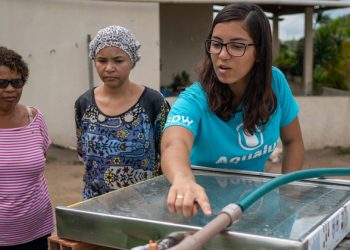UN Secretary-General to convene renowned women leaders’ roundtable to advance global effort to counter unprecedented pandemic-caused fallout
New York, 1 July — UN Secretary-General António Guterres will convene a roundtable of leading women finance experts and economists, on 1 July from 8-10 a.m. EDT, focused on finding solutions to critical financing issues that are threatening to derail sustainable development efforts in a growing number of countries.
The virtual roundtable, Rebirthing the Global Economy to Deliver Sustainable Development, is the first in a series. These dialogues intend to hone solutions and actions in a process that began in May when more than 40 world leaders convened to spur global financing for development efforts in critical areas needing urgent action concerning debt, liquidity, external finance, preventing illicit financial flows, and ensuring a sustainable recovery.
Finding a need to engage new and diverse perspectives, to rethink old models, and to recover from COVID-19 stronger, the Secretary-General has invited 14 top economists to discuss solutions for the issues of external finance, debt and international trade. The discussions will focus on how these dialogues can inform and influence transformation of the current global financial architecture to support inclusion and sustainability beyond COVID-19.
The roundtable, moderated by British broadcaster Zeinab Badawi, will be opened by the Secretary-General and includes the participation of Deputy Secretary-General Amina Mohammed and Indonesian Finance Minister Sri Mulyani Indrawati, among renowned women economists, practitioners, policy makers and academics.
The COVID-19 pandemic, which has claimed more than 500,000 lives and resulted in more than 10 million confirmed cases, has gone beyond a health and humanitarian crisis to also become an unprecedented global development emergency.
To respond to the pandemic and to ensure a recovery that is sustainable and inclusive, the Secretary-General of the United Nations has called for a comprehensive multilateral effort aligned to Agenda 2030 and the Paris Agreement. This includes measures to suppress the transmission of the virus and tackle the immediate social and economic dimensions of this human crisis.
It also requires an assessment of the structural vulnerabilities that facilitated the crisis and plans for a recovery that puts inclusiveness and sustainability at the center of all efforts.
Roundtable discussion to focus on three key areas
Debt: Even before the pandemic, a very large number of developing countries were either already in debt distress or projected to be unable to service their debts. Now, with COVID-19, the ability to repay debt has been even further reduced, and more countries are experiencing similar critical prospects.
To support low-income countries, the G20 announced a debt standstill for official external debts of 76 low-income countries, but countries have been slow in taking advantage of this largely due to fears that downgrades by credit rating agencies will lead to increased costs of private financing options. Debt management and relief for low- and middle-income countries requires new considerations to build back better, inclusively, sustainably, and in ways that strengthen social protection to leave no one behind.
External finance: In addition to the extremely challenging state of fiscal deficits, shortfalls in government incomes and total debt accumulation, the COVID-19 pandemic has severely affected developing countries sources of external finance. Nations are seeing capital flight. In March 2020 alone, large-scale outflows of capital and financial assets from emerging economies amounted to US$83.4 billion.
Foreign direct investment (FDI) is projected to decline between 30% and 40% and remittances are projected to drop 20%. At the same time, official development assistance (ODA) continues to remain significantly below the Addis Ababa Action Agenda Goal of 0.7% gross national income (GNI) of donor countries.
International Trade: Lockdowns have significantly curbed manufacturing output in the major hubs of world trade, including in China, Germany and the United States, which collectively account for around 34% of global manufacturing exports. Disruptions in major manufacturing hubs have weakened demand for industries that rely on base metals and minerals, leading to sharp declines in their price.
Smaller manufacturing economies are facing a sharp decline in exports amid falling demand in developed economies. Trade in developing countries is projected to decline between 13% and 32%. COVID-19 has also brought major repercussions for tourism, with the number of international airline passengers projected to drop between 40% and 80% this year.
Moreover, a shift in decades-long trends in international trade from greater globalization and global value-chains towards increasingly regional and nationally based supply chains will have unforeseen impacts. This has been further demonstrated by countries prioritizing domestic consumption over exports during this crisis.
To view the Roundtable: Watch on UN Webcast: http://webtv.un.org
For more information, please email: sdgfinancing@un.org
Media contact: Dan Shepard, UN Department of Global Communications, shepard@un.org
Hashtags: #Fin4Dev #RiseForAll #GlobalGoals
List of Invitees in alphabetical order with Twitter handles
(Co-Convenor) Sri Mulyani Indrawati, Minister of Finance of Indonesia
Alicia Bárcena, Executive Secretary of ECLAC (@aliciabarcena)
Leila Fourie, CEO, Johannesburg Stock Exchange (@LeilaFourie)
Caroline Freund, Director, World Bank (@CarolineFreund)
Naila Kabeer, Professor of Gender and Development, London School of Economics (@N_Kabeer)
Stephanie Kelton, Professor of Economics and Public Policy, Stony Brook University (@StephanieKelton)
Bogolo Joy Kenewendo, former Minister of Investment, Trade and Industry of Botswana (@BogoloKenewendo)
Victoria Kwakwa, VP, World Bank (@Victoriakwakwa)
Mariana Mazzucato, Professor in the Economics of Innovation & Public Value at University College, London (@MazzucatoM)
Ngozi Okonjo-Iweala, former Finance Minister of Nigeria and AU Special Envoy to Mobilize International Economic Support for Continental Fight Against COVID-19 (@NOIweala)
Kate Raworth, Senior Associate, Environmental Change Institute, Oxford University’s Environmental Change Institute (@DoughnutEcon)
Antoinette Sayeh, Deputy Managing Director, IMF
Minouche Shafik, Director, London School of Economics
Vera Songwe, Executive Secretary of the United Nations Economic Commission for Africa (@SongweVera)
[END]



